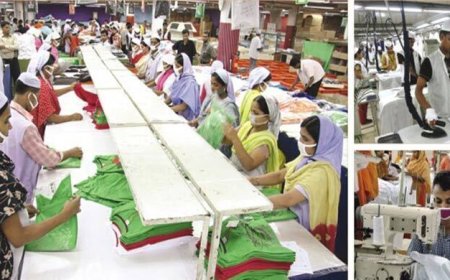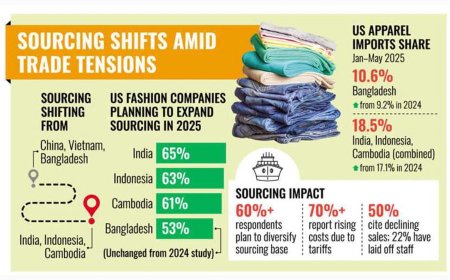Cottage industries are declining as production decreases
There is a call for formalizing CMSMEs to boost economic growth.

Smaller and medium industries in Bangladesh are facing a decline as their production has steadily decreased over the years, raising concerns about job creation, according to officials.
The manufacturing growth in cottage, micro, small, and medium enterprises (CMSMEs) has been slower in fiscal year (FY) 2023-24 compared to previous years, official data revealed on Saturday.
Approximately 85% of the country’s employment is generated in the informal sector, which primarily consists of CMSMEs.
Economists warn that the slower growth of CMSMEs leads to reduced job creation, as these industries are major contributors to employment in Bangladesh.
CMSMEs also serve as a support industry for larger industries, and their decline in production will ultimately affect the manufacturing sector at larger firms, they noted.
According to the Bangladesh Labour Force Survey-2022, about 60 million people—representing 84.9% of the total working population—are employed in the informal sector.
Recent data from the Bangladesh Bureau of Statistics (BBS) showed that industrial production growth in micro, small, and medium enterprises (MSMEs) dropped to only 5.07% in FY24, a decline from the previous two fiscal years.
The growth rate for MSMEs was 15.39% in FY22 and 9.03% in FY23, according to the National Accounts Statistics-2024 report.
The production of machinery and equipment within MSMEs saw a sharp decline, with negative growth of 45.55% in FY24. In previous years, the sector had seen positive growth.
Other sectors like wood products, printing, chemicals, pharmaceuticals, electronic products, and transport equipment also experienced negative growth in FY24.
Similarly, the production index for cottage industries also showed a decrease in FY24, with a year-on-year decline of 6.7%. In FY22 and FY23, cottage industries had grown by 7.67% and 9.96%, respectively.
Despite some growth in machinery and equipment manufacturing in cottage industries, sectors like electronic items, petroleum products, and rubber goods faced negative growth.
Dr. Zahid Hussain, a former World Bank economist, explained that declining domestic demand has negatively impacted CMSMEs. He attributed this to higher inflation and a drop in real wages, reducing people's purchasing power and, consequently, demand for CMSME products.
He recommended that the government ensure a consistent supply of power and gas, formalize smaller manufacturing sectors, secure both internal and external markets, and reduce inflation to stimulate CMSME production.
Dr. Masrur Reaz, chairman of Policy Exchange Bangladesh, warned that slower CMSME growth could harm employment levels. He emphasized that CMSMEs create the most jobs in the country, and their decline could push more people below the poverty line.
Reaz also stressed that these industries are vital to the larger manufacturing sector's success and urged for their recovery.
He called for the formalization of cottage, micro, and small industries to ensure their survival and contribute to national economic growth. Many of these industries operate informally, and formalizing them would enhance their capacity to generate decent employment.
What's Your Reaction?





















































































